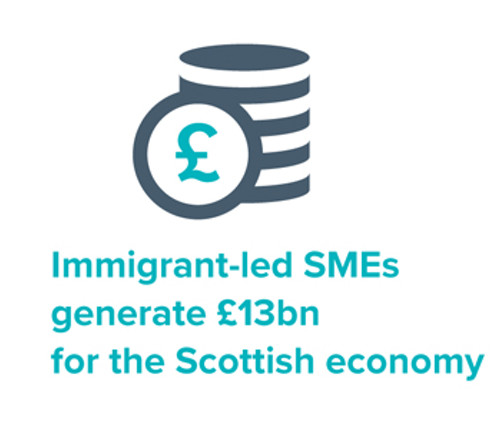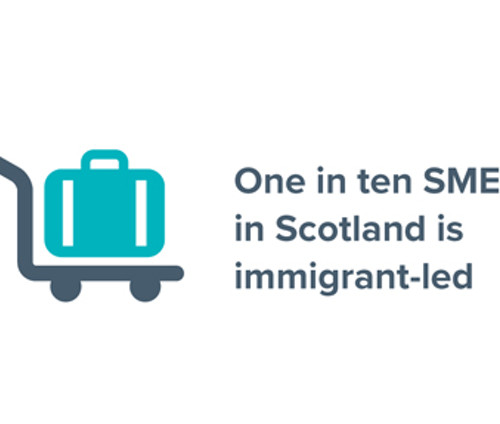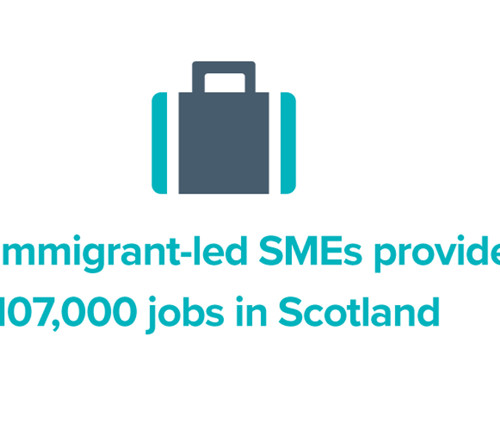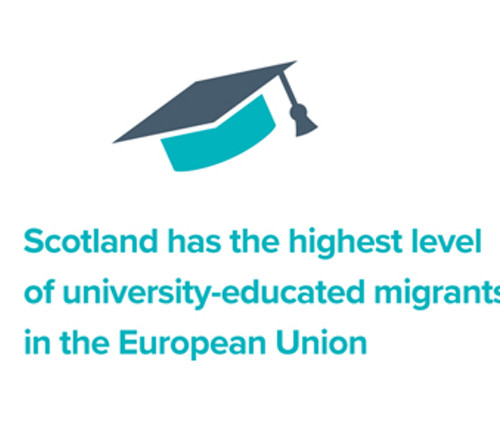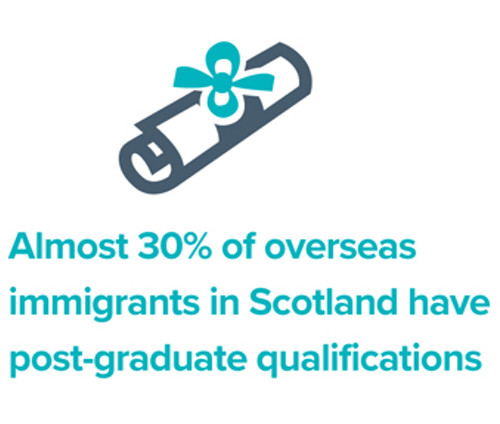Starting over: migrant entrepreneurship in Scotland
Executive summary
Over the last couple of years immigration has been the subject of much scrutiny and public discourse in the UK. However, this debate has largely focused on UK-wide immigration issues, neglecting other dimensions such as the economic, social and cultural contributions of migrant entrepreneurship.
This report, commissioned by the Federation of Small Businesses in Scotland, draws on the analysis of statistical data from the Global Entrepreneurship Monitor (GEM), the Small Business Survey (SBS) and the Wealth and Assets Survey (WAS), published research, and over 40 interviews with migrant entrepreneurs and key informants to articulate the substantive contributions migrant entrepreneurship makes to Scotland. The report also advances recommendations as to how such contributions could be enhanced further.
This report finds that entrepreneurs who have moved to Scotland from elsewhere in the UK, Europe or the rest of the world have a positive and tangible impact on economies and communities across the country. The economic contribution they make to the Scottish economy is vast.
Immigrant-led SMEs, to highlight one group, generate £13 billion in revenues and 107,000 jobs for the Scottish economy.
By being significantly more likely to have post-graduate qualifications and family business experience, they are more likely to identity business opportunities and start new promising ventures in Scotland. This is true of all migrant entrepreneurs whether they have migrated from England, Estonia or Ethiopia; or located in Scotland’s largest cities or remotest settlements.
The overall picture that emerges from this research is that migration – including overseas immigrants, RUK in-migrants and Scottish returnee emigrants – is associated with skilled, ambitious individuals who are more entrepreneurial than native Scots.
Nevertheless, despite having higher growth expectations and export ambitions, immigrant-led ventures struggle in particular to turn their ambitious intentions into successful and established businesses. They experience erratic growth, low export activity and no performance advantage. Given the size of the prize on offer, supporting these entrepreneurs to overcome these barriers to growth should be a key priority for the Nevertheless, despite having higher growth expectations and export ambitions, immigrant-led ventures struggle in particular to turn their ambitious intentions into successful and established businesses. They experience erratic growth, low export activity and no performance advantage. Given the size of the prize on offer, supporting these entrepreneurs to overcome these barriers to growth should be a key priority for the Scottish Government, its enterprise agencies and local government.
The impact of migrant entrepreneurs extends far beyond economics, however. By offering different products and services to consumers in Scotland, they act as a bridge between their home and host cultures. By enabling interactions between people from different cultures and different countries, they enhance integration efforts and cultural understanding and make Scotland a more attractive place to visit, start a business, study and work. This is true of the African couple running a care home, a Romanian food entrepreneur, an English-French duo running an award-winning hotel, a Chinese tech entrepreneur and many, many more.
Contribution
Immigrant-led SMEs generat £13bn
Entrepreneurial
Migrants in remote areas
Leadership
One in ten SME's in Scotland is immigrant led
Jobs
107,000 jobs in Scotland from immigrant led SMEs
Education
High level of university educated migrants
Higher education
High proportion with post-graduate qualifications
Key findings
1. The scale of migrant enterprise in Scotland
-
 One in ten SMEs in Scotland is immigrant-led with at least one partner or director having been born outwith the UK.
One in ten SMEs in Scotland is immigrant-led with at least one partner or director having been born outwith the UK. - In 2017, there were about 310, 000 self-employed persons in Scotland with about 28,000 of these being self-employed overseas immigrants (9%). Almost half of these immigrant entrepreneurs (44%) are located in Scotland’s three largest cities of Glasgow, Edinburgh and Aberdeen.
- Around 220, 000 people were trying to start a business or running a new business in Scotland in 2017. This comprised of about:
- 118,000 (53%) Scottish non-migrants (Scottishborn adults that have stayed in the same region they were born in all their life);
- 32,198 (14%) Scottish regional in-migrants (Scottish-born adults that have lived elsewhere in another region in Scotland or the wider UK);
- 37,339 (17%) RUK in-migrants (persons born elsewhere in the UK that now live in Scotland);
- 17,567 (8%) Scottish returnee emigrants (Scotsborn adults that have lived overseas but have returned and now live in Scotland);
- 18,416 (8%) overseas immigrants (non UK-born adults living in Scotland).
2. Relatively greater entrepreneurial capacity
-
 Migrant entrepreneurs in Scotland are significantly more likely to have post-graduate qualifications, family business experience, export ambitions and higher growth expectations, including job creation. For example, one in two immigrant-led start-ups (49%) expect to employ at least five people in five years’ time, compared to one third of start-ups in Scotland.
Migrant entrepreneurs in Scotland are significantly more likely to have post-graduate qualifications, family business experience, export ambitions and higher growth expectations, including job creation. For example, one in two immigrant-led start-ups (49%) expect to employ at least five people in five years’ time, compared to one third of start-ups in Scotland. - Immigrants are also able to import unique knowledge and business models into Scotland as well as employ more subtle intrinsic abilities, including foreign languages, cultural knowledge, and international networks, in their entrepreneurial pursuits in Scotland.
- Overseas immigrants and Scottish returnee emigrants are nearly twice as likely to be actively trying to start a business or run their own business, compared with Scottish non-migrants. This is also the case for Scottish and RUK in-migrants who are 24% and 67% more likely to be involved in early-stage entrepreneurial activity.
- Compared to the rest of the UK, immigrant entrepreneurs in Scotland are less likely to engage in necessity-driven entrepreneurship, owing to low levels of immigrant unemployment and high levels of education amongst immigrants.
- Overall, migration is associated with skilled, ambitious individuals who are more likely to spot business opportunities and start new promising ventures.
- However, immigrant-led ventures are found to experience erratic growth, low export activity and no performance advantage, demonstrating that their economic potential is not being fully maximised.
3. Economic contribution
-
 Despite the unrealised potential, immigrant-led SMEs in Scotland are estimated to have generated about £13 billion in revenues in 2017.
Despite the unrealised potential, immigrant-led SMEs in Scotland are estimated to have generated about £13 billion in revenues in 2017. - Similarly, immigrant-led employer SMEs are estimated to have provided 107,000 jobs to employees in Scotland. However, while they also employ native Scots, this research has found that there is a preference for employing people from their country of origin and other migrants due to the convenience of mutual cultural understanding with fellow migrants.
4. Influences on the local economy
-
 Immigrant-led ventures are more likely to have strong ties with the local business community and their supply chain. Immigrant entrepreneurs also appear to be very well embedded within fellow migrant networks. However, despite a clear need for support with industry networks, growth advice and access to finance, they are unaware of, or reluctant to engage with, the mainstream enterprise support ecosystem in Scotland.
Immigrant-led ventures are more likely to have strong ties with the local business community and their supply chain. Immigrant entrepreneurs also appear to be very well embedded within fellow migrant networks. However, despite a clear need for support with industry networks, growth advice and access to finance, they are unaware of, or reluctant to engage with, the mainstream enterprise support ecosystem in Scotland. - Immigrant-led ventures can contribute to the revitalisation of struggling urban spaces and take great pride in their contributions.
- Higher migrant enterprise in localities is found to be associated with increases in entrepreneurial activity by native Scots in such localities.
- Immigrants in rural areas in Scotland are more entrepreneurial than their local counterparts, and as such, contribute to revitalised economic activity in such areas. By providing employment they can often help make public services viable (e.g. schools).
5. Immigrant entrepreneurs’ countries of birth
-
 Census statistics show that Scotland is home to entrepreneurs from across the world. Around 70% of immigrant self-employed persons come from two regional blocks: Middle East and Asia (32%) and EU countries (38%). Significant numbers also come from Africa (12%), the Americas, the Caribbean and others (10%) and the Republic of Ireland (5%).
Census statistics show that Scotland is home to entrepreneurs from across the world. Around 70% of immigrant self-employed persons come from two regional blocks: Middle East and Asia (32%) and EU countries (38%). Significant numbers also come from Africa (12%), the Americas, the Caribbean and others (10%) and the Republic of Ireland (5%).
- EU-26 immigrant entrepreneurs comprise of two main groups: EU-16 (20%) which includes EU member countries in March 2001 such as Ireland, Germany and France; and EU-10 (17%) which includes countries such as Poland, Hungary and Romania.a
6. Household wealth
-
 Household wealth is distributed differently between Scots-born, RUK in-migrant and immigrant entrepreneurial households. This is broken down as follows:
Household wealth is distributed differently between Scots-born, RUK in-migrant and immigrant entrepreneurial households. This is broken down as follows:
- RUK in-migrant entrepreneurial households are the wealthiest in Scotland – the typical household has an estimated wealth of over £510,000.
- Scots-born entrepreneurial households command a lower level of wealth – the typical household has an estimated wealth at almost £340,000.
- Household wealth levels of typical immigrant entrepreneurial households, non-entrepreneurial immigrants and Scots-born non-entrepreneurial households are not significantly different and range around £150,000.
7. Cultural contribution
-
 In communities across Scotland, migrant entrepreneurs act as a bridge between their home and host cultures. Interactions between these entrepreneurs, Scots-born employees and customers enable greater integration and mutual cultural understanding in wider society.
In communities across Scotland, migrant entrepreneurs act as a bridge between their home and host cultures. Interactions between these entrepreneurs, Scots-born employees and customers enable greater integration and mutual cultural understanding in wider society. - By offering different products and services to consumers in Scotland, immigrant entrepreneurs contribute to the diversity of cultural experiences that can be enjoyed in Scotland.
- Much of migrant enterprise appears to be underpinned by diverse business ideals and perspectives that have been incorporated into their business models in Scotland from their home countries.
[a] EU-16 countries in full: Austria, Belgium, Denmark, Finland, France, Germany, Greece, Ireland, Italy, Luxembourg, the Netherlands, Portugal, Spain, Sweden, Malta and Cyprus. EU-10 countries in full: Czech Republic, Estonia, Hungary, Latvia, Lithuania, Poland, Slovakia, Slovenia, Bulgaria and Romania. Note that Croatia joined the EU in 2013 so immigrants from Croatia were non-EU at the 2011 census.
Recommendations
In light of the above findings, this study puts forward the following four key recommendations:
Full details on each of the above recommendation areas are provided in the downloadable report below.


